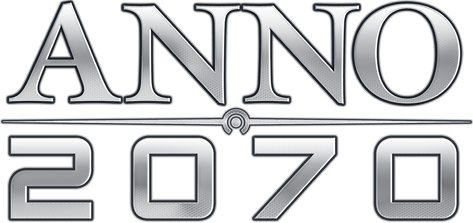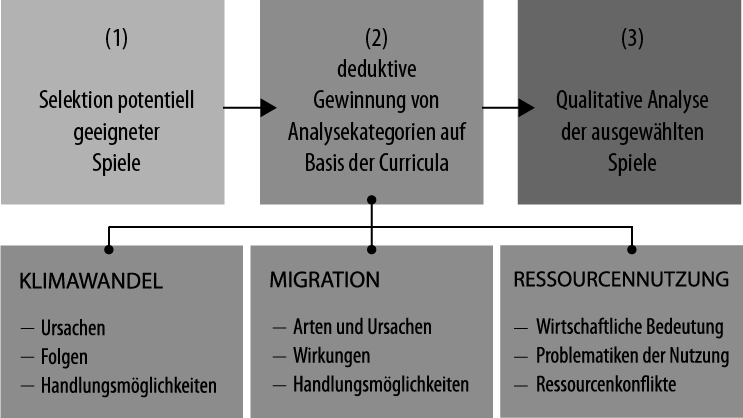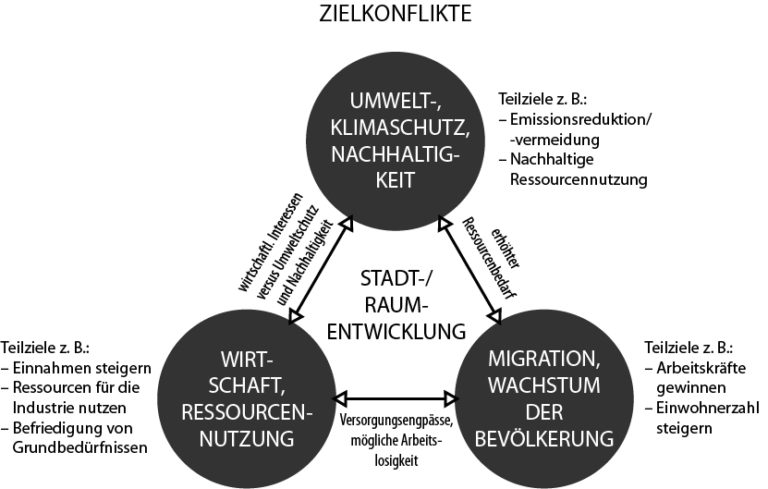Digital Games for Learning in Geography Education
Verbundvorhaben zwischen dem Institut für Geographiedidaktik (UzK) und dem Cologne Game Lab (TH-Köln)



The Goal
Maturity through digital games: Examination of the potential of digital games for the practice of informed and justified decision-making in Geography education
Selected geographical topics:

Migration

Climate Change

City Development

Resource Management
Steps
Analysis
Analysis of 21 selected entertainment games; followed by expert interviews of game developers.

Interviews
Observations of adolescents playing the selected games; qualitative interviews of teachers as well as students/players.

Guidlines
Development of guidelines for geography teachers and game developers.

About the Project
(German Only)
Requirements for the Games:
01.
Include at least one of the Geographical topics
02.
High popularity and/or well-received by critics

Active Team Members

Alexandra Budke
Alexandra Budke is a Professor of Human Geography and Geography Education
at the Institute of Geography Education at the University of Cologne. Important fields of research are argumentation, citizenship education, intercultural learning and the use of digital media in geography lessons.

Emmanuel Guardiola
Emmanuel Guardiola is professor of game design at the Cologne Game Lab. He has worked on more than 30 major titles in the games industry. He holds a PhD in computer science and conducts research on player psychological profiling at the CNAM Laboratory of Computer Science (Paris).

Joelle-Denise Lux
Joelle-Denise Lux is a doctoral student at the Institute for Geography Education at the University of Cologne. For her dissertation about the usage of games in Geography Education she draws on her academic
backgrounds in both geography and multimedia design. Current focus of
her research is the fostering of system competence in the context of recent socio-ecological challenges with the help of digital strategy
games.

André Czauderna
André Czauderna is an education researcher working at the Cologne Game Lab of TH Köln, where he manages and develops the study programs BA and MA Digital Games as well as teaches player research. His research focuses on processes of learning in strategy and management games, gaming affinity spaces, and game design education. Czauderna holds a PhD from Johannes Gutenberg University Mainz.
In the Past
Games Versus Reality? How Game Designers Deal with Current Topics of Geography Education
Lux, J.-D.; Budke, A.; Guardiola, E. Games Versus Reality? How Game Designers Deal with Current Topics of Geography Education. In: Multimodal Technol. Interact. 2021, 5, 70. https://doi.org/10.3390/mti511
Digital entertainment games frequently address current societal issues that are also dealt with in geography education, such as climate change or sustainable city development, and give various opportunities for learning. However, in order to be fully able to determine the games’ educational potential and to instruct meaningful reflection on them in class, the designers’ approaches to realism regarding these topics need to be understood. Therefore, we have developed a model of realism in games and conducted 9 interviews with 10 experts from the entertainment game industry about their understanding of and dealing with realism concerning the represented geographical topics. In many cases, the interviewees’ approach to incorporating real-world issues can be regarded as beneficial for their games’ educational potential, and some designers even pursued learning goals. However, we also identified approaches that can result in questionable presentations of real societal issues. We found the most problematic one to be the prioritization of player expectations for the sake of perceived realism. This approach may lead to the depiction of stereotypes and common misconceptions. The results presented in our study may help teachers to prepare reflection on such misrepresentations in class, or designers to become more aware of the educational implications of different forms of game realism
How Insights into Commercial Games Can Improve the Design of Educational Games on Complex Societal Problems
Czauderna, A., Guardiola, E., Lux, J-D., Budke, A. (2021): How insights into commercial games can improve the design of educational games on complex societal problems. In: Proceedings of the 15th European Conference on Games Based Learning: ECGBL, Academic Conferences and Publishing International, pp. 170-177. doi:
10.34190/GBL.21.119
Many educational games have been criticized for their lack of enticement to players, which is attributed, among other factors, to a low degree of complexity and a limited amount of choices, when compared to entertainment games (Sanford et al., 2015). From the perspective of learning theory, this is insofar problematic as successful processes of learning require player motivation, great agency, and a well-balanced level of complexity, which correspondents and adapts to players’ knowledge and skills (Gee, 2007). We thus assume that educational game design can learn from entertainment games, i.e., must look at them in order to improve educational games when it comes to their allure, their simulation/moderation of complexity, and their enabling of meaningful choices. With this in mind, we conducted a series of studies on commercially successful and critically acclaimed simulation and strategy games such as Cities: Skylines, Civilization VI: Gathering Storm, and Tropico 6 referring to the topics of climate change, urban planning, migration, and/or resource management – from the perspective of geography education. Our research focused on different aspects such as the games’ realism, complexity, geographical topics, facilitation of decision-making, and principles of political education, utilizing 18 game analyses and 8 qualitative interviews with game designers of these games. Based on the results of these studies, the present paper derives seven recommendations for the design of games on complex societal problems that can be used for educational purposes in geography education. Overall, the paper contributes to the greater effort to bridge the gap between entertainment game design and educational game design, thereby facilitating the creation of games that are both motivational and educational.
Guidelines for the Design of (educational) Digital Games on Complex Societal Issues
Lux, Joelle-Denise, André Czauderna, Emmanuel Guardiola, und Alexandra Budke (2021): Guidelines for the Design of (Educational) Digital Games on Complex Societal Issues. SocArXiv. June 18. doi: 10.31235/osf.io/9fq4u.
Designers of digital entertainment games and designers of games for education can learn from each other when it comes to gameplay mechanics, content and mediation techniques that enable a fun and at the same time educational experience for players. The following design guidelines bring together the perspectives of entertainment game industry and educators. Based on a range of studies, they present 11 recommendations to facilitate the design of games on complex social and socio-ecological issues such as climate change, migration, city development and resource conflicts – suitable for any designer who wants to provide an enriching game experience.
Game Designers as Agents of Political Education
Czauderna, André, und Alexandra Budke. 2021. „Game Designer als Akteure der politischen Bildung“. MedienPädagogik: Zeitschrift für Theorie und Praxis der Medienbildung 38 (Aneignung politischer Information): 94-116. https://doi.org/10.21240/mpaed/38/2021.01.25.X.
Many digital games designed for entertainment are relevant for political education because they allow their players to slip into roles of political decision-makers and deal with topics such as urban development, migration, resource conflicts or climate change. Thus, game designers can be perceived not only as agents of the culture industry, but also as agents of political education. The present article reconstructs how designers of entertainment games shape this role, from the perspectives of media education and geography education, based on a qualitative content analysis of nine semi-structured interviews. In particular, it is shown that game designers’ positions towards the design of political decision-making are largely consistent with the «Beutelsbach Consensus», which constitutes a set of basic principles for political education in Germany. Nevertheless, since entertainment game designers are first and foremost obliged to entertain their players, their products cannot be judged according to educational criteria just as strictly as materials created specifically for political education. Therefore, the use of entertainment games in political education must be accompanied by an in-depth classroom discussion. A critical reflection of digital games in political education should discuss, among other things, their neglect of democratic negotiation processes.
How Digital Strategy and Management Games can Facilitate the Practice of Dynamic Decision-Making
Czauderna, André and Budke, Alexandra (2020): How Digital Strategy and Management Games Can Facilitate the Practice of Dynamic Decision-Making. In: Education Sciences, 10 (4), pp.1-24. https://www.mdpi.com/2227-7102/10/4/99/pdf
This paper examines how digital strategy and management games that have been initially designed for entertainment can facilitate the practice of dynamic decision-making. Based on a comparative qualitative analysis of 17 games—organized into categories derived from a conceptual model of decision-making design—this article illustrates two ways in which these games may be useful in supporting the learning of dynamic decision-making in educational practice: (1) Players must take over the role of a decider and solve situations in which players must pursue different conflicting goals by making a continuous series of decisions on a variety of actions and measures; (2) three of the features of the games are considered to structure players’ practice of decision-making and foster processes of learning through the curation of possible decisions, the offering of lucid feedback and the modification of time. This article also highlights the games’ shortcomings, from an educational perspective, as players’ decisions are restricted by the numbers of choices they can make within the game, and certain choices are rewarded more than others. An educational application of the games must, therefore, entail a critical reflection of players’ limited choices inside a necessarily biased system.
![Figure 1. Model of decision-making design in digital games (own illustration, including an adapted depiction of the gameplay loop from Salen/Zimmerman [12], p.316](https://dispielgeo.de/wp-content/uploads/2020/06/education-10-00099-g001-300x209.png)
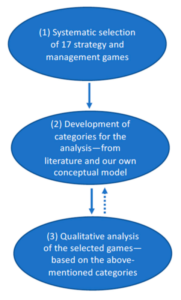
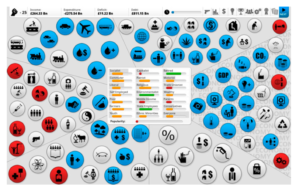
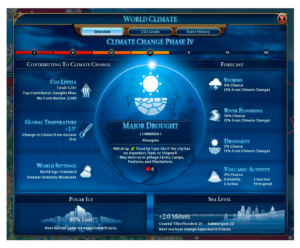
Playing with Complex Systems? The Potential to Gain Geographical System Competence through Digital Gaming
Lux, Joelle-Denise and Budke, Alexandra (2020): Playing with Complex Systems? The Potential to Gain Geographical System Competence through Digital Gaming. In: Education Sciences, 10(5), 130. https://www.mdpi.com/2227-7102/10/5/130/pdf
The current socio-ecological challenges and phenomena that are major topics of geography education, like climate change and migration, are highly complex. Maturity in these contexts requires a networked way of thinking, and a systemic competence that is difficult to develop in geography classes alone. Digital games that simulate complex systems which include the pressing issues of today’s challenges may be a useful supplement to foster systems thinking. In this study, we develop a framework to assess the complexity of in-game systems. A subsequent analysis of a selection of current commercial strategy and simulation games shows how system complexity is designed differently in the various games. Based on these results, we make recommendations for the selection and use of different games in formal and informal learning contexts.
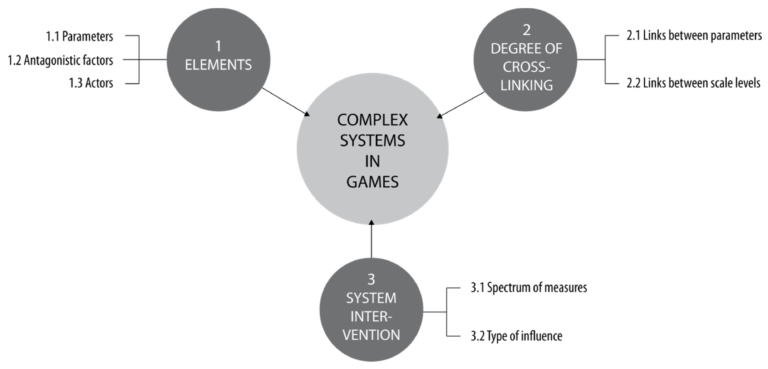
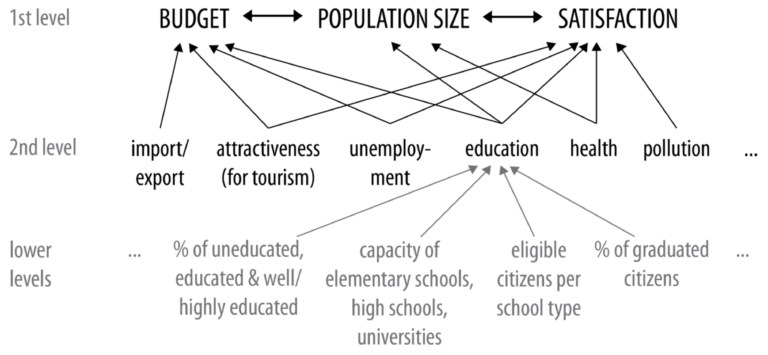
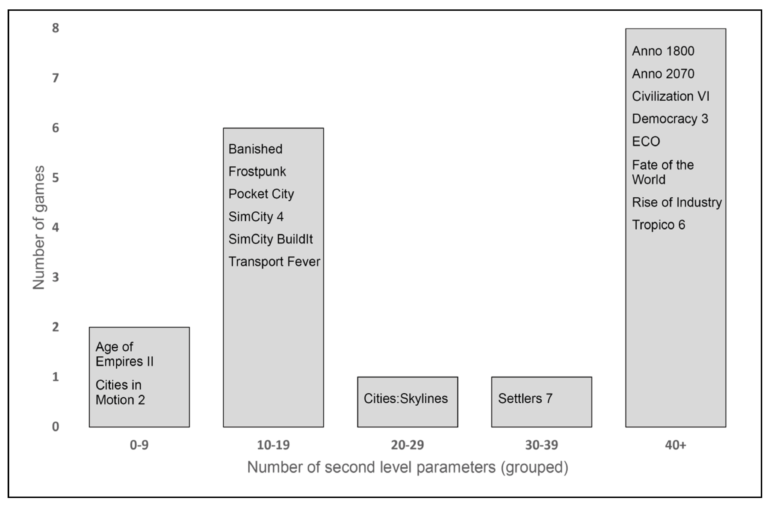
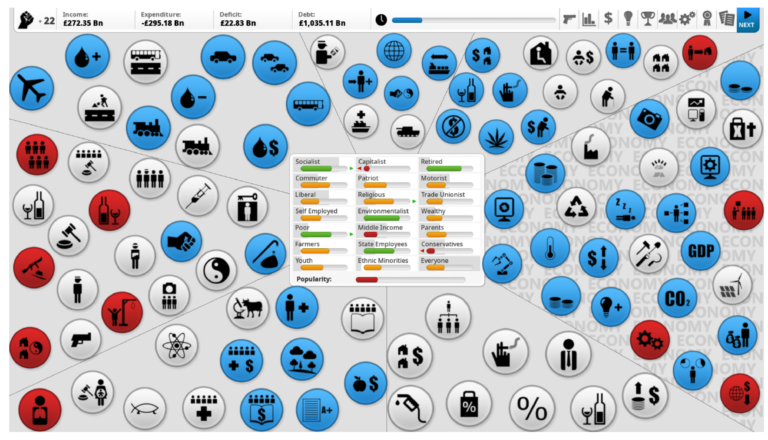
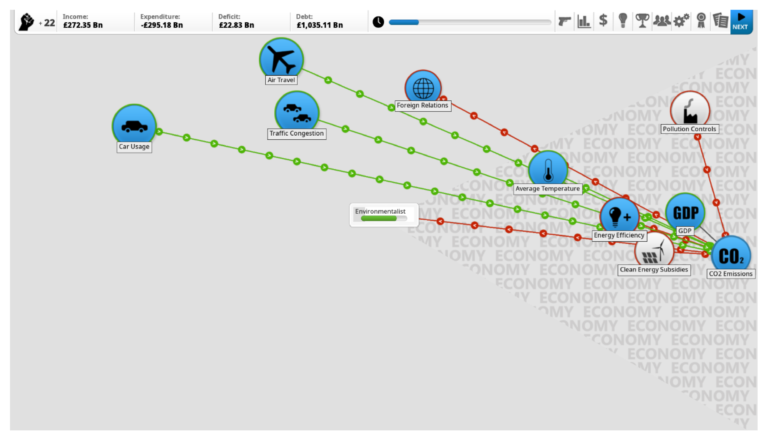
All just a game? Geographical specialist knowledge on current social challenges in digital games
Lux, Joelle-Denise und Budke, Alexandra (2020): Alles nur ein Spiel? Geographisches Fachwissen zu aktuellen gesellschaftlichen Herausforderungen in digitalen Spielen. In: GW-Unterricht 160 (4/2020), 22-36. https://doi.org/10.1553/gw-unt
Trotz besonderer Potentiale von digitalen Unterhaltungsspielen für die Bildung finden diese bislang kaum Anwendung im Geographieunterricht, was an mangelnder Kenntnis über deren fachliche Relevanz liegen könnte. Die vorliegende Studie versucht Potentiale und Grenzen kommerzieller Strategie- und Simulationsspiele für den Kompetenzbereich Fachwissen im Geographieunterricht herauszuarbeiten, insbesondere für aktuelle gesellschaftliche Themen. Unsere Spieleanalyse zeigt, dass besonders in den Themen Klimawandel und Ressourcennutzung viele lehrplanrelevante Aspekte dargestellt werden und die aktive Problemlösefähigkeit von Spielerinnen und Spielern gefördert wird, aber dass die Spiele auch einige Systemzusammenhänge vereinfachen, was im Unterricht reflektiert werden sollte.
Model for Success Conditions
&
Guidlines
for Teachers and Game Designers

For Teachers
Model for Success Condition and Guidelines for teachers on the use of digital games in geography classes.

For Game Designers
Model for Success Condition and Guidelines for the design of (educational) digital games on complex societal issues.
More Details
Poster


